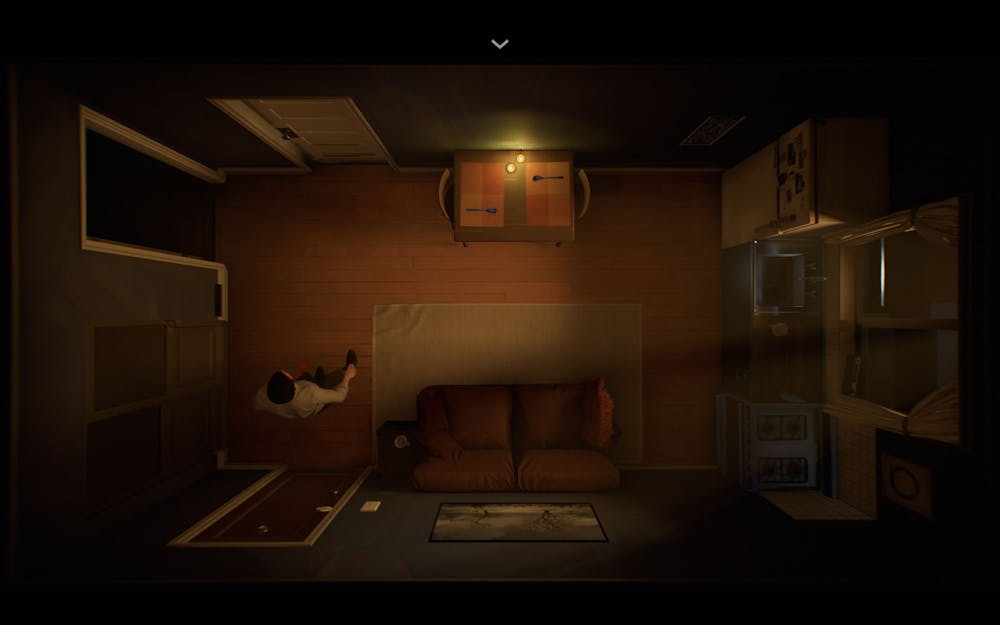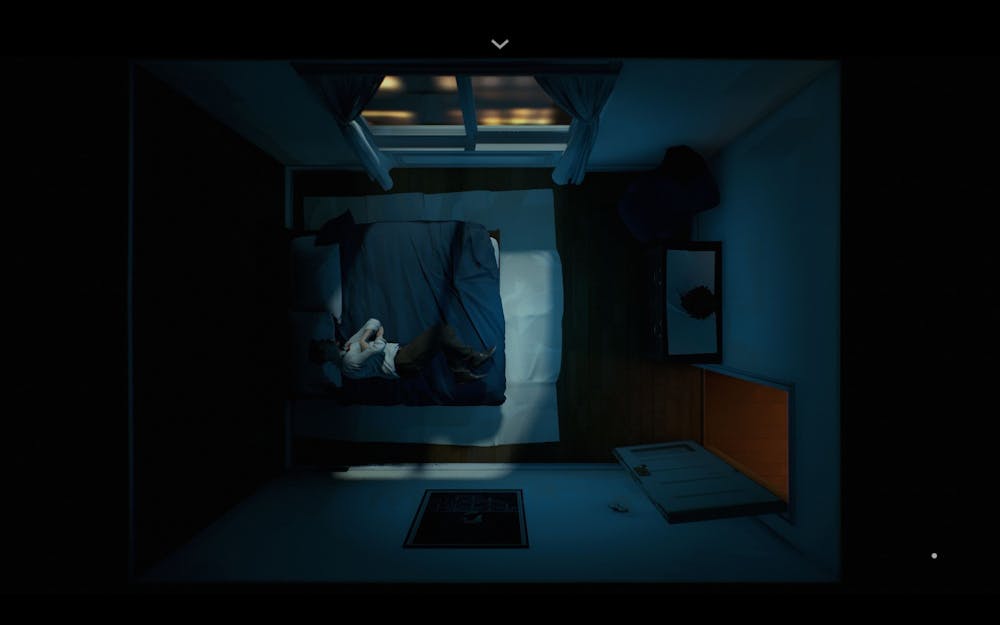Disclaimer: This review was conducted on an Xbox One X.
If I began with another unoriginal anecdote about how “the pandemic has taught me x, y, or z,” then living through the last year must have dissolved some of my brain cells too. More significant than any possible bout of introspection, over the last year, I have encountered many lessons about what is deserving of my time, energy, and most importantly, my money. Video games are unsurprisingly one hobby that have been incredibly affected by this perspective shift. In short, triple-A titles no longer suffocate my scope of interest, and I have become more invested in the development and release of independent titles.
Which is why when the looping puzzler “12 Minutes” finally received an official release date this summer, I was anxious to predownload Luis Antonio’s first major project. After plenty of replays and much trial-and-error, it is clear that this freshman outing by an aspiring indie artist might not have been so deserving of that excitement.
The ‘loop’ unravels over time
The concept “it’s ‘Groundhog’s Day’ but think dramatic thriller instead of comedy” might sound uninspired, but with every third indie title these days being a psychological horror game with a bunch of fourth-wall breaks, Antonio’s point-and-click roguelike was bound to pique even the most casual gamers interest. While concerns about the intertwined relationship of gameplay and story progression are fair, “12 Minutes” does enough to keep players enticed and motivated to explore while avoiding major bouts of frustration and confusion, at least initially.
Let’s touch on the time well-spent first. From a gameplay and narrative standpoint, unlocking new paths along the plotlines, or in this case timelines, and witnessing how the simple story expands, is satisfying. It feels wonderful to uncover new bits of dialogue, see how those choices play out, then immediately repeat the whole sequence. That knowledge stays fresh and impactful without restricting your time to roam and discover. Players can learn through the trial-and-error process of combining different items together with enough leeway to still advance, and as the limits of the gameworld become more defined and understood, the story naturally moves through its paces; unfolding beautifully over the course of just a few hours.

Image from Nomada LLC
Once you hit the mid to late game though, the fundamental loop of “spawn, explore, make choice, die, repeat” the title is built upon starts to lose its innovative appeal and succumbs to the typical pitfalls of shoddy puzzle games. By the time you discover the game’s second major ending, every outcome has been mastered, every object touched, and all the wacky dialogue choices have been selected. At this point the game has all but molded you into a TASBot in the slowest and most excruciating way possible just to find out that you spent those 10 or so minutes setting up bupkis. Which all stands in stark contrast to how Antonio described the game in previews, referencing how his muse Jonathan Blow convinced him good game design revolves around planning and execution. The player should be completely aware of why they failed and prepare better for next time, a wish that goes woefully unfulfilled in practice.
Not to mention some key progress points, though very few, can only be unlocked through pure happenstance, which feels very unearned and cheap everytime. Without giving too much more away in terms of gameplay, it never has and never will be enjoyable, from a player perspective, to go trotting around any interactive space guessing without even a faint sense of direction; again, the exact opposite of what Antonio intended. Oftentimes “12 Minutes” sacrifices what makes a puzzle satisfying for the sake of that mystical open-ended, butterfly effect style of storytelling that so many studios have tried to replicate in recent years. The thrill does not come from the experience but the solution and its consequences, and that shift in focus causes a lot of late game surprises to fall flat and populates those usual moments of euphoria with straight facepalms. At its worst, it feels like your father giving you swimming lessons by tossing you into the kiddie pool. It is not a subtle “figure it out on your own” and more an irritatingly obvious “just stand up and you’ll be fine.”
Production that needed a little more time
Though the path to get to those nuggets of information is fraught with much tiring repetition, the writing and directing in “12 Minutes” are both incredibly rewarding. No matter if the consequence of the player’s actions lead to a light-hearted story beat or an earth-shattering revelation, the writing cements it as fulfilling. The thrill of uncovering solutions through wit and deduction is the bread and butter of point and click adventure games and when “12 Minutes” remains in that wheelhouse, it boosts the whole genre forward by threading the evolution of the plot through every other aspect of the title. It feels less like an indie puzzler and more like a playable whodunnit, and that keeps everything fresh even when you eventually encounter those “what am I supposed to do again” moments. It all collectively bolsters replayability and player motivation, and those moments of success feel even more liberating because of how three-dimensional the characters feel, thanks in part to the star-studded cast.

Image from Nomada LLC
Each performance is very well done, especially for a trio of actors that are not well-known for their voice work. It is really difficult to deliver lines in pieces instead of sequentially on stage or in front of the camera, not to mention the fact that most of the game was developed in at least two different locations with pandemic protocols coming into play at the tail end of production. Though it is fragmented, the emotion, distress, and rage come through on key, but it is not sustainable. I am not gonna complain about Daisy Ridley welcoming me home with a warm and joyful pregnancy announcement, but by the hundredth go-around I developed a nervous tick while trying to skip through all the faux cutscenes like I was performing a speedrun. The direction is solid enough to where not a single cast member outshines another, but those award worthy performances get continually diluted by hearing the same lines delivered in the same way repeatedly.
Ultimately, there is little in terms of story that can be discussed critically without spoiling much of the late game, but what is not as risky to discuss is the fact that surprises await you around every corner. Albeit, many of those surprises range from uncomfortable to repulsive, so anyone hoping to pick up “12 Minutes” should be prepared for a wild ride with plenty of equally shocking and disgusting moments. Overall, this title takes every chance to rip the rug out from under you in the most gut-wrenching and stomach-turning way possible.
Can frustration be fun?
“12 Minutes” dances a fine line between a fulfilling interactive thriller and a laborious story slog that loses all its substance based upon how it is delivered to the player. The sense of discovery and adventure packed into this uptown studio apartment sends you into a frantic state of exploratory ecstasy in the early game. However, there is a noticeable lull in the open-ended tactics the game prides itself on when the credits are just out of reach and crossing that gap through your own volition is nothing short of maddening.

Image from Nomada LLC
If I order a pizza from my favorite restaurant but on the way back from picking it up I hit rush hour traffic, run out of gas, get issued a speeding ticket, and have to change a flat tire, will I actually enjoy that now cold and soggy excuse for a meal once I sit down at my dinner table? Or does that stress, toil, and difficulty make that meal ultimately worth it and possibly taste better? In this case, my pizza is “12 Minutes” and the begrudging obstacles on my drive home are the thorny gameplay mechanics and certain abominable plot details. Some would argue that the struggle makes the dish, and others would contend that in the end, all that strife was a waste of energy, no matter what’s left over.
If you enjoy it in the moment though and try not to think too harshly about where or how the ingredients were sourced, the good times will roll right along. So why not just eat the pizza on the way back instead?

Sources: The Guardian, Variety, IMDB
Images: Nomada LLC
Featured Image: Nomada LLC



















